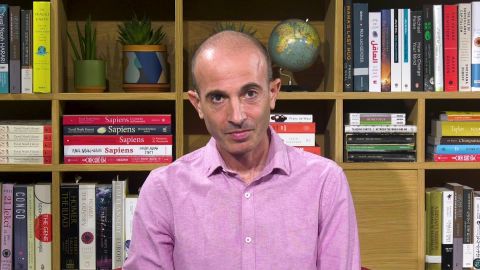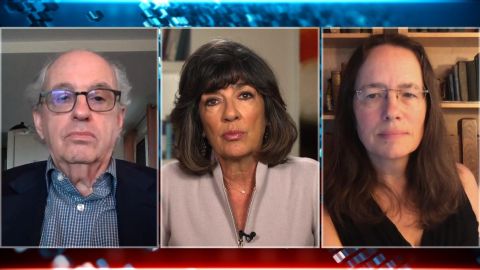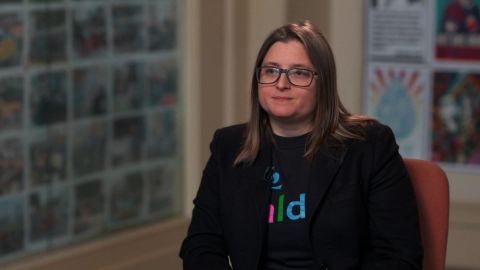Read Transcript EXPAND
CHRISTIANE AMANPOUR: Now, Democratic nominee Joe Biden has pledged to make an effort to reunite migrant parents and children who’ve been separated by the Trump administration’s zero tolerance policy. Tragically, the parents of 545 children removed from their families at the border between 2017 and 2018 cannot be found. Lawyer Bridget Cambria offers free legal services to immigrant families as part of the organization out there, the People’s Justice Center. And she sits down now with our Hari Sreenivasan to discuss why the asylum system has to change.
HARI SREENIVASAN: Christiane, thanks. Bridget Cambria, thanks for joining us. We’re just a few miles away from the Berks County Residential Facility. What is that to the people who are unaware?
BRIDGET CAMBRIA, IMMIGRATION ATTORNEY: The Berks County Residential Center is one of three family detention centers in the United States. Its detention centers where immigration holds families and children who are in their immigration proceedings or for the purpose of removing them. But it is the secure detention of families and children in the United States. There are three facilities two in Texas and one in Pennsylvania.
SREENIVASAN: So what is the difference between a residential center and a jail or a prison?
CAMBRIA: I guess it depends what you consider to be a jail. I consider residential centers and ICE custody to be secured detention. And I consider it to be a jail. It’s akin to a minimum-security prison. And the reason it is, is because it’s a facility where you’re not free to leave. So if a child or a parent wanted to walk out of the building, they would be stopped. It’s possible they would be prosecuted by ICE for escape. Any place where you’re not free to leave is a prison. They’re under procedures daily which are akin to a prison. You wake up at 6:00 a.m., you have to be counted. You eat when you’re told. You eat what you’re told. You receive medical care when someone else decides you receive medical care. So for example, a parent can’t decide that their child gets cough medicine, for example. Those decisions are made for you because they’re in detention. There is no difference in my mind between a prison and an ICE Detention Center.
SREENIVASAN: This process has been going on well, before the Trump administration, the Obama administration had the dubious title of deporter-in-chief. What’s different about this, the prosecution of how we are dealing with these people now?
CAMBRIA: I do want to make one thing really clear. My organization, Aldea, represented families both during the Obama administration and during the Trump administration. And during the Obama administration, it was really difficult for our families. We had families and long-term detention. We had families that suffered in these detention facilities when they talk about the kids in cages. Those have existed for a really long time. I think that if we move forward and we move into a new administration, I believe that we’re going to have to honor the mistakes that we made before. And one of those really grave mistakes was family detention. But I’ll tell you that under the Trump administration, it’s gone from zero to 100 real fast.
SREENIVASAN: How so?
CAMBRIA: Well, under the Obama administration, a family would enter the system and have shot. A child would have a shot to seek protection. What we’ve seen under the Trump administration is policy after policy after policy. Changes made to the asylum system. I believe it’s something like more than 400 changes to the asylum system in four years. And the whole purpose of every single change that’s made, every single policy you hear on the news is to prevent people from seeking asylum. It’s how do we keep kids, especially, how do we keep kids away from judges? How do we keep kids away from courts? How do we prevent a child or parent from even filing an application under the law? Asylum is the law in this country. We are obliged to provide access to protection for people who request it. And right now, we’re flouting that obligation. We don’t care to provide it. What Trump has done in this administration is he has taken away the most vulnerable among us, their right under the law to seek protection is targeted at families and it’s targeted at children specifically. And the reason is this is that they qualify. So if a kid gets to a judge or a parent gets to a judge, and they can file an application, they might win. And that’s what’s terrifying to this administration. They don’t want to have immigration laws that function in a way that provide protection to children and families fleeing from Central America, fleeing from certain types of persecution. They want to specifically exclude those people from receiving protection. And you got to ask your question, why? Why are we targeting kids and families with these really harsh policies?
SREENIVASAN: Look, the President has been on stage before he has repeatedly mocked asylum seekers.
(BEGIN VIDEO CLIP)
TRUMP: And the asylum program is a scam. Some of the roughest people you’ve ever seen, people that look like they should be fighting for the UFC. They read a little page given by lawyers that are all over the place, you know, lawyers, they tell them what to say. You look at this guy, you say, wow, that’s a tough cookie. I am very fearful for my life.
(END VIDEO CLIP)
SREENIVASAN: That sounds like your average client?
CAMBRIA: No. And let me tell you that immigration and asylum law is one of the most complex areas of the law. There is no one word or no magic word that grants you protection in the United States. It’s not. These are really complex cases, complex laws. That’s why so many lawyers are needed. But let me tell you, these big guys seeking protection, big guys deserve protection too if they fit under the law. But I’ll tell you that that’s not the majority of clients that we see. If you look on the border right now of Mexico where they’re forcing 70,000 people to remain, those are parents and kids, those are really little kids. Those are kids that their dad has been taken from them in ransom in Mexico, those are women and mothers who are protecting their daughters from rape or gender-based violence. Those are the people seeking asylum.
SREENIVASAN: Why should people be led into the U.S. while they wait for their claim to be determined? Why should the government not detain someone as the proceedings dragged on? Why should they get to enjoy the rights inside the United States in the interim?
CAMBRIA: Well, I don’t believe that the United States is a country where we believe in incarcerating people that don’t present a danger or flight risk. We’re not a — we shouldn’t be a country of mass detention of people who have no — that pose no threat to the United States. What does that fund? What does that fuel? The cost of incarceration is so high. Why would we imprison 50,000 people that pose no danger to the United States? The only thing it does is it provides funds for private prisons. It serves no other purpose. And throughout our history, there have been period after period after period of people seeing the United States as a beacon of hope and freedom and safety and security and opportunity. Generation after generation, I’m sure that your family came here at some point. My family came here at some point. We all have our immigration story. So I was it OK for us, and not for these families. This is what our country was founded on. It’s also the law. Asylum is the law of the United States. There is nothing about people coming to the United States and seeking protection being deemed illegal. They’re human beings seeking protection. And that’s actually lawful. They’re lawfully applying to come to the United States of America. So if you have a group of people that are lawfully seeking entry into the United States and they go through a lawful process, what’s the purpose of detaining them, other than two things profit or deterrence.
SREENIVASAN: So is the deterrence working?
CAMBRIA: I would say not. I think if you have 70,000 families on the Mexican side of the border, simply waiting for a court date, it’s not doing a really good job deterring people from coming. I think that the number one story that you hear from families in detention, and I have families in detention right now in Texas at 18 months, babies detained 18 months with their mothers, here in the Berks County Residential Center, babies and their parents at seven months at detention, and you talk to them about, you know, well, you’re still here, are you, you know, do you want to continue fighting? And they say, I can’t go back, if I go back, I’m going to die. And you know what, I believe in America, like this is what we hear that the United States is going to protect us. They see the United States as a place of laws and a place of safety. And I don’t think it’s unreasonable for them to think that because I still believe that that’s what our country is. And I think if you talk to most Americans, they would agree with that.
SREENIVASAN: Someone who is watching this is going to say, you know what, it sounds like you’re telling me the President has kept one of his campaign promises that he has tightened the borders, there are 70,000 people less in the United States than before. And, you know, this is the process slowed down.
CAMBRIA: It shouldn’t be the policy of the U.S. government to punish children and families who enter a lawful process. You know, when we saw family separation, everyone got really upset because we were targeting enforcement, really, really strict enforcement policies against children. But it’s universal, that every single policy that the Trump administration has done against asylum seekers is directly targeted at children and families. So, I mean, if your campaign promise is to torture kids, I don’t know if that’s a promise that I really want to agree with our follow.
SREENIVASAN: What are some of the circumstances that people are fleeing Central or South America, you had a 12-year-old boy that was a client of yours, what did he see?
CAMBRIA: It’s really important to understand the history of Central America to know why people are fleeing. Central America in the 80s and 90s went through various civil wars, really violence, Guatemala went through a genocide. And that doesn’t sort of correct itself one or even two generations later. And what happened in Central America is the conflicts morphed from a civil war into an area — into a zone where you have really dangerous transnational criminal organizations, which are the gangs, the MS-13, or the Mara 18, who really dominate communities within El Salvador, Honduras, and Guatemala. And you’re talking about the young man, who we represent. He fled El Salvador with his mother because his father was murdered on the street outside his house. And he saw his father and his father had been shot about 18 times. And what was important about his father was he was a really high ranking official in El Salvador and his job was to confront the gangs. So obviously following the death of his dad, life became very dangerous for he and his mother. So they decided to come to the United States. They came in 2017. And they enter the United States near El Paso. And at that time in El Paso, the Trump administration was piloting a project to separate children from their parents. And this young boy and his mother enter the United States with nothing but her wedding ring and a Bible and her son. And they took all three things from her. And this young man, who with his mother requested protection from a border officer, he was 12 years old, he was handcuffed, and he was taken by force from his mother and put into a vehicle. At the same time, his mother was handcuffed and put into a separate vehicle. They were taken to separate facilities. The young man was taken from Texas, flown all the way to New York where he was detained. The mother remained in detention in El Paso never knowing where her son was, and being restricted from having communication from him. And when I say restricted, it’s not for want of trying, she asked every single person, where is my son, and nobody would tell her where and nobody would connect her with a phone call. And if you read the transcripts of her criminal case, she’s in a courtroom with dozens of other parents. And the judge presiding, asks everyone in the room who had their children taken from them. And the record reflects that everyone raises their hand. And he tries to talk to this mother and ask her, well, you know, do you know you’re in a criminal courtroom right now, like, what can I do for you, and she says, I can’t say another word until you tell me where my son is. I don’t know where he is. And the judge says, I’m sorry, I can’t help you. And he acts — he asked the government, where is her son? He said, I don’t know. And we went out to El Paso, got her out of custody and reunited her with her son. But she was the only parents in that facility at that time that was reunited with her child, every other parent that she met in that facility was removed without their child. And those are the 545 children that are now here, that the government cannot find their parents.
SREENIVASAN: How do you lose parents? How do you, I mean, how does that even happen? I mean, this sort of resurfaced in the headlines. But how can 545 kids not know where their parents are or inversely, how can parents not be clamoring for their child?
CAMBRIA: Cruelty is the answer. What they did to those families at that time, and going into July of 2018 was insanely cruel, debilitating. Why can’t they find 545 parents because they didn’t care to write down their information, they didn’t care to link a child with their parent, which is as simple as writing down a number. They didn’t care if those children found their parents ever again. They didn’t care if those parents found their children. The idea was never to put them back together. The idea was to punish them so that there would be wonderful, huge news articles that would serve as a deterrent factor to everyone else back in those countries. These children, not just the 545, but the thousands upon thousands of children that were separated from their parents were a political message and nothing more. And we sacrifice their lives and their well-being to send a message, by the way, a message that didn’t work. And we destroyed their lives in the process. Those children will never be OK. Their parents will never be OK. They will suffer for the rest of their lives because of what we did to them. And why can’t they find them because they didn’t care in the beginning to figure out how to put them back together, that was never the purpose. The purpose was to punish those families.
SREENIVASAN: You know, there are members of the government that have said, look, basically any good parent would want their child back. Wouldn’t they know that their child is still here? Wouldn’t they be banging on the door, so to speak and say, I know who my daughter is, I know who my son is. Here I am, give them back.
CAMBRIA: How do they know that those parents are alive? They were fleeing persecution. How do they know that those parents were alive? Also, how did those parents know how to communicate with the United States government? The largest portion of people targeted, and zero tolerance were indigenous Guatemalans, many of whom don’t speak Spanish. They speak in indigenous dialect. They live in the mountains of Guatemala and the most rural of communities to say why don’t they have the faculties to knock on the door of the United States is insulting. The question is, why don’t you know where they are? And the question is, God willing that they’re still alive.
SREENIVASAN: Bridget Cambria thanks so much for joining us.
CAMBRIA: Thank you.
About This Episode EXPAND
Christiane speaks with Norm Ornstein and Heather Cox Richardson about election day. She also speaks with Yuval Noah Harari about how our species is faring during its current existential crisis. Hari Sreenivasan speaks with immigration attorney Bridget Cambria about why she believes the asylum system must change.
LEARN MORE


